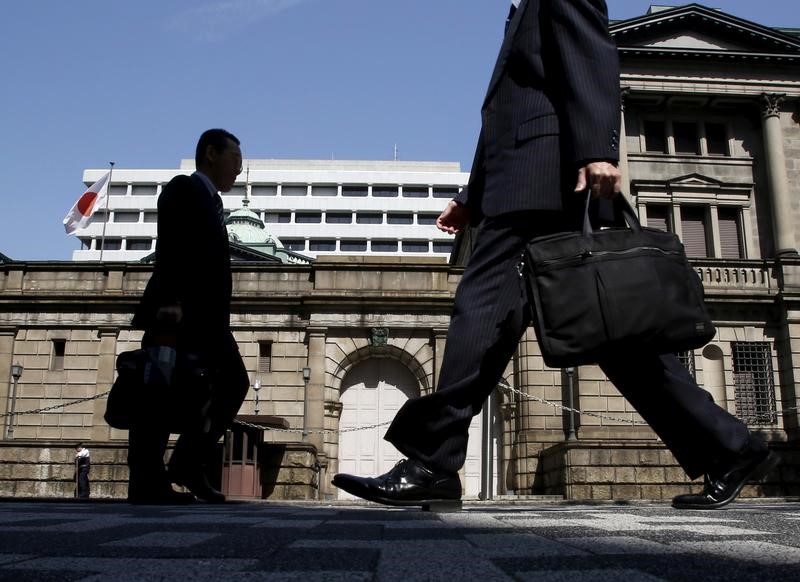By Tomo Uetake
TOKYO (Reuters) - The question of when the Bank of Japan should wind back crisis-era stimulus has dogged policymakers for some time, but its less aggressive support for the stock market in recent weeks has some investors speculating it's already taking its foot off the gas.
The central bank's support for the stock market, a part of its wider push to inflate asset prices, has generally followed an unwritten but easy-to-decipher rule: if the stock market falls more than 0.2 percent by midday, it buys exchange-traded funds (ETFs).
But since April 9, when Haruhiko Kuroda entered his second term as BOJ governor, it refrained from buying on four out of seven days when the Topix index (TOPX) fell more than that.
While the fall in Topix on those days was still relatively small and the BOJ's move could simply be fine-tuning following the record amounts bought March, some investors suspect it could be the start of a withdrawal from its commitment to buy six trillion yen ($54.01 billion) of ETFs a year.
"There are two possible interpretations of this. The BOJ could have started stealth tapering. Or it could be just slowing down the pace after it bought too much in February and March," said Shingo Ide, chief equity strategist at NLI Research Institute.
For a graphic on BOJ's ETF buying, click https://reut.rs/2IuI8IK
The BOJ has a precedent of quietly stepping back from its policy target.
The bank has said it is aiming to increase its JGB holdings by 80 trillion yen per year, but the actual pace has been gradually slowing for nearly two years.
In April, its JGB holdings rose just 48 trillion yen from a year earlier, 40 percent less than its official guideline.
NLI Research's Ide says there's a reasonable chance the BOJ has already began “stealth tapering” in stock buying, but that he'd need to see how the BOJ handles stock buying in coming weeks to get a clearer view.
For a graphic on BOJ's stealth tapering, click https://reut.rs/2Kz6dyN
Behind rising suspicions of tapering lie the market's concerns that the BOJ's buying is neither sustainable nor necessary at current stock prices, which are not too far from 26-year highs.
Data from the BOJ and Tokyo Stock Exchange show the central bank was the largest buyer of Japanese stocks last year and analysts estimate it is already the largest shareholder of many listed companies.
Many market participants regard the BOJ's involvement as an unhealthy intervention that does little to support the economy. Some BOJ policymakers have called for the need to consider slowing purchases in the future.
Despite the criticism, Governor Kuroda has hosed down talk of tapering the asset purchases, arguing they are part of the BOJ's aggressive drive to achieve its 2 percent inflation target.
He told lawmakers last month it was premature to debate when and how the central bank should slow its purchases of ETFs.
For a graphic on BOJ's tweaks to ETF buying pattern, click https://reut.rs/2LbCux1
People familiar with the bank's thinking say the BOJ's commitment to buy six trillion-yen in ETFs a year is a more binding target than its more flexible guideline of buying 80 trillion-yen in JGBs, which is used to keep the 10-year yield around zero percent.
Slowing ETF buying significantly would require a decision by the nine-member board and would be a major policy change that could be interpreted by markets as the bank whittling down stimulus.
In the year to April, the BOJ's ETF holding increased 5.8 trillion yen, slightly less than the target but still within monthly fluctuations.
Some market participants think the BOJ could be more flexible in stock buying, by reducing purchases when the market is higher and increasing them when the market heads south.
Indeed, on March 22, when the Nikkei was falling to six-month lows, the BOJ bought stocks even though the Topix was down 0.08 percent in the morning.
"Without the BOJ's buying, the Nikkei would have broken the psychologically key 20,000 yen in March," said Yasuo Sakuma, chief investment officer at Libra Investments.
"But now that the Nikkei has rebounded since then, I assume the BOJ makes a decision in a more comprehensive manner -- by taking price levels also into account. It could begin, if not already, a stealth tapering when the Nikkei rises to 23,000 or 24,000."
